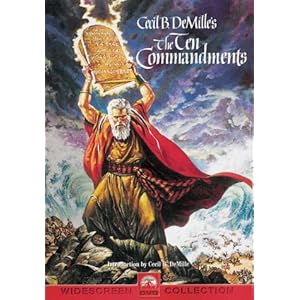
The solution to morality’s incredible complexity is not to simplify and dumb down. Ignoring morality’s vast profoundness is a massive error. It would be nice if everything was absolute; if there were really black and white moral principles and ethics, but the high deviation of social moral norms tells us that absolute morality is wishful thinking. I certainly share this wish, we would have less moral conflict, conflict in general really, and I wouldn’t have to think and write so much about this stuff, giving me more time to sell drugs, and sacrifice animals or whatever else we atheists do. But wishful thinking is not a logical argument; religion’s simplified morality is utterly wrong.

Religion became permanently frozen in the archaic Bronze Age with the Ten Commandments. The Ten Commandments are an absolute joke as a moral guide. These ten rules stand above all other arbitrary religious restriction, because God himself felt they were important enough to physically write them on stone. Just think what good would have been possible for an omniscient creator. Think of all the unjustifiable crimes that could have been outlawed; genocide, slavery, rape, torture, cruelty, and human sacrifice. What a different story the bible would have been.

But no, instead Yahweh wasted four of the ten rules on his own vanity. Four rules for a God that can’t be harmed. Four rules wasted that could have done so much good for a morally primitive culture. God does not want us saying OMG, but sacrificing Isaac is cool. God cannot accept being a number two god, but raping your daughter is justifiable. Yahweh likes it when we take a day off to worship him, but stoning others for minor offenses was not worth his time to stop.

The next six are barely acceptable, only because some of the time lying, stealing, and murder do cause objective harm. However, war can be justifiable, deceiving to protect others is good, and stealing to feed your starving family is probably the right thing to do. But unfortunately consequentialist morality is too advanced for a barbaric god. If you are hiding children in your house, and lied to the nice Nazis, Yahweh is fucking pissed, and will get his nice chosen people to disembowel you or something.
The Ten Commandments is not only a failure of crappy rules, but is immoral for what hypothetical Yahweh did not say. This is a different argument from “why bad things happen?” because Yahweh is intervening in our world. The cop-out of God standing back to protect free will holds even less ground ; he is directly responsible for the moral code. Any harm that comes immediately after is a failure of the Hebrew God.
Wash your hands, sickness is actually caused by bacteria and viruses not evil spirits, and different genders are equal, don’t treat woman like shit. Do not worry so much about crimes without victims, tolerate others with different beliefs, do not go to war for stupid theology reasons; would be a few of the things that I would have thrown down to prevent future harm. But Yahweh did not, and the mass human suffering that has resulted from the inadequate Ten Commandments is 100 percent his fault. He chose to get involved with our world, and he did a shitty job.

If Mount Sinai was just like any bible or religious teaching; my logical objections would still stand, but I would not be as angry. The Ten Commandments are taught to children as an absolute moral guide, it guides political leaders on the extreme right in our government, and there are still representations of it in government buildings; it affects me! The simplified morality shown in the Ten Commandments is used to make other moral decisions. Abortion is wrong black and white, cause god says so, homosexuality is wrong cause it’s a principle in the bible. No moral reasoning is being taught or used; black and white rules are simply regurgitated.

I do not understand why religions aversion to change is seen as a positive quality to religious people. We advance, we improve, and we increase our ability in moral understanding. Why do religions suppress this? To be fair, I do not think they really do because they will defend and rationalize biblical atrocities. This shows that moral reasoning interprets the bible, not the other way around, but my argument still stands because they
think that the bible determines morality, and many theists mirror their judgment from it.

Please! We as human beings must advance our moral capacity. Religion does not have it right. It is simplified, black and white, and absolute. This simplification has done harm and is still currently harming others. The fear of moral relativism is irrational. Human beings in general want to be moral; we want to minimize harm and do good. Moral relativism is not a weak excuse to justify harming others. We need to break away from religion’s moral monopoly to begin our long, difficult, journey toward moral perfection.
 Religion became permanently frozen in the archaic Bronze Age with the Ten Commandments. The Ten Commandments are an absolute joke as a moral guide. These ten rules stand above all other arbitrary religious restriction, because God himself felt they were important enough to physically write them on stone. Just think what good would have been possible for an omniscient creator. Think of all the unjustifiable crimes that could have been outlawed; genocide, slavery, rape, torture, cruelty, and human sacrifice. What a different story the bible would have been.
Religion became permanently frozen in the archaic Bronze Age with the Ten Commandments. The Ten Commandments are an absolute joke as a moral guide. These ten rules stand above all other arbitrary religious restriction, because God himself felt they were important enough to physically write them on stone. Just think what good would have been possible for an omniscient creator. Think of all the unjustifiable crimes that could have been outlawed; genocide, slavery, rape, torture, cruelty, and human sacrifice. What a different story the bible would have been.